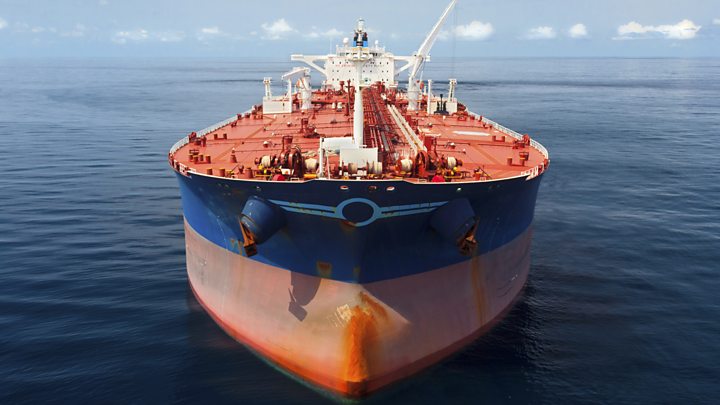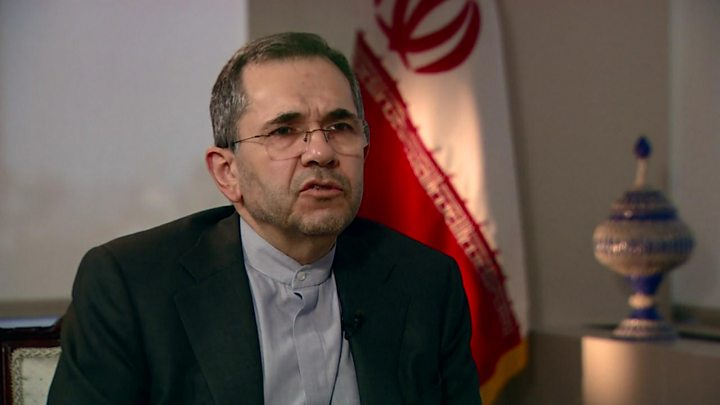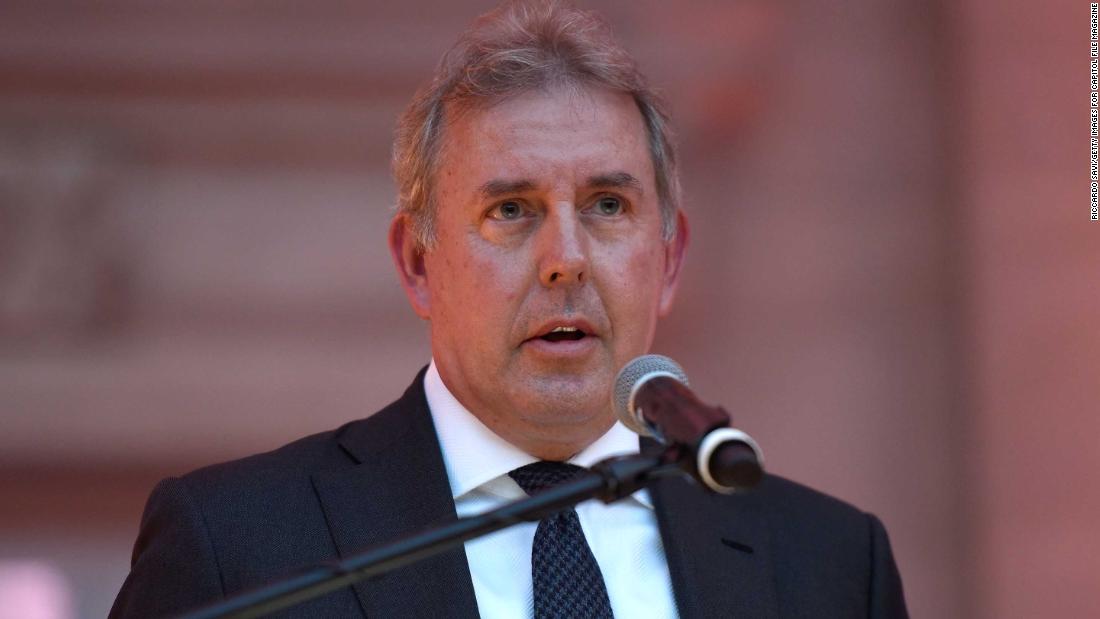Iranian boats tried to impede a British oil tanker near the Gulf - before being driven off by a Royal Navy ship, the Ministry of Defence has said.
HMS Montrose, a British frigate shadowing the tanker British Heritage, was forced to move between the three boats and the tanker, a spokesman said.
He described the Iranians' actions as "contrary to international law".
Iran had threatened to retaliate for the seizure of one of its own tankers, but denied any attempted seizure.
Boats believed to belong to Iran's Islamic Revolution Guard Corps (IRGC) approached British Heritage and tried to bring it to a halt as it was moving out of the Gulf into the Strait of Hormuz.
Guns on HMS Montrose were trained on the Iranian boats as they were ordered to back off, US media reported. The boats heeded the warning and no shots were fired.
The BBC has been told British Heritage - which is registered at the port of Douglas, in the Isle of Man - was near the island of Abu Musa when it was approached by the Iranian boats.
HMS Montrose had been shadowing British Heritage from a distance but came to its aid once the Iranian boats began harassing the tanker, BBC defence correspondent Jonathan Beale said.
Although Abu Musa is in disputed territorial waters, HMS Montrose remained in international waters throughout.
A UK government spokesman said: "Contrary to international law, three Iranian vessels attempted to impede the passage of a commercial vessel, British Heritage, through the Strait of Hormuz.
"We are concerned by this action and continue to urge the Iranian authorities to de-escalate the situation in the region."
What does Iran say?
Quoting the public relations office of the IRGC's Navy, the Fars news agency said, in a tweet, the IRGC "denies claims by American sources" that it tried to seize British Heritage.
"There has been no confrontation in the last 24 hours with any foreign vessels, including British ones," the IRGC added, according to the AFP news agency.
Iranian foreign minister Mohammad Javad Zarif said the UK made the claims "for creating tension".
"These claims have no value," Mr Zarif added, according to Fars.
Why are UK-Iran tensions escalating?
The relationship between the UK and Iran has become increasingly strained, after Britain said the Iranian regime was "almost certainly" responsible for the attacks on two oil tankers in June.
Last week, British Royal Marines helped the authorities in Gibraltar seize an oil tanker because of evidence it was carrying Iranian crude oil to Syria in breach of EU sanctions.
In response, an Iranian official said a British oil tanker should be seized if the detained ship was not released.
Iran also summoned the British ambassador in Tehran to complain about what it said was a "form of piracy".
On Wednesday, Iranian President Hassan Rouhani mocked the UK, calling it "scared" and "hopeless" for using Royal Navy warships to shadow another British tanker in the Gulf.
HMS Montrose had shadowed British tanker the Pacific Voyager for some of the way through the Strait of Hormuz, but that journey had passed without incident.
"You, Britain, are the initiator of insecurity and you will realise the consequences later," Mr Rouhani said.

Media playback is unsupported on your device
The Royal Navy has a frigate, four minehunters and a Royal Fleet Auxiliary support ship already stationed in a permanent Naval Support Facility in the region, at Mina Salman in Bahrain.
This is enough to provide reassurance, but probably not to deal with a crisis, the BBC's Jonathan Beale said.
"HMS Montrose will not be able to provide protection for every commercial vessel in the Gulf with links to the UK," he added.
"Ministers will now have to contemplate sending another Royal Navy warship to the region. But in doing so, that may only further escalate tensions with Iran, which is something the government wants to avoid."
The UK has also been pressing Iran to release British-Iranian mother Nazanin Zaghari-Ratcliffe who was jailed for five years in 2016 after being convicted for spying, which she denies.
Could things get worse?
Iran appears to have been attempting to make good on its threat against British-flagged vessels in the wake of the seizure of an Iranian tanker off Gibraltar.
But though this incident has a specifically bilateral dimension, it is also a powerful reminder that the tensions in the Gulf have not gone away.
And with every sign that the dispute over the nuclear agreement with Iran is set to continue, things may only get worse.
The episode may add some impetus to US-brokered efforts to muster an international naval force in the Gulf to protect international shipping.
But most worrying of all, it shows that elements within the Iranian system - the Revolutionary Guard Corps's naval arm, or whatever - are intent on stoking the pressure.
This inevitably plays into President Trump's hands as Britain and its key European partners struggle to keep the nuclear agreement alive.
What about US-Iran relations?
The US has blamed Iran for attacks on six oil tankers in May and June.
The chairman of the US military's Joint Chiefs of Staff said, on Wednesday, it wants to create a multi-national military coalition to safeguard waters around Iran and Yemen.
The news followed the Trump administration's decision to pull out of an international agreement on Tehran's nuclear programme and reinforce punishing sanctions against Iran.
European allies to the US, including the UK, have not followed suit.
Iran's ambassador to the UN has insisted Europeans must do more to compensate Tehran for economic losses inflicted by US sanctions.
Tehran has begun to nudge the levels of its enriched uranium beyond the limits of a nuclear deal agreed with a group of world powers, in small and calculated steps.
Majid Takht-Ravanchi told the BBC, Iran would move to the "third phase" of its stepped-up uranium enrichment programme unless the Europeans kept promises to uphold the economic benefits of the accord.
https://www.bbc.com/news/uk-48946051
2019-07-11 09:05:43Z
52780330365006

